Thessaloniki experienced a great de-industrialization wave during the period 1988-2002. The economic crisis of 2009 and the refugee crisis of 2015 created additional and very pressing economic, social and environmental challenges for the city. Due to the ongoing adverse external conditions, today the city is forced to operate under very difficult conditions, including minimal public spending on social services on the side of the Greek government, as well as wider social and urban problems such as unemployment, poverty, brain-drain and urban decline.

In recent years, Thessaloniki has been home to a vibrant startup community and has an open and co-creative culture for social innovation and urban development. It also has solid strategic visions for waste management and urban resilience (social, economic, and environmental). However, the context of economic austerity, declining economic activity, rising unemployment, and brain-drain are putting significant pressures on the city’s open culture and creative dynamism.
But the effort does not stop there, and the search for new opportunities to highlight the city’s potential pushes the Municipality of Thessaloniki to new movements and synergies. At the institutional level, the Urban Waste management program was recently expanded with the implementation of new actions in all streams of recycling and the Circular Economy (paper, packaging, glass, plastic), with planning and a programmatic framework of actions, initiatives and actions laying the foundations and conditions , for a more sustainable human, modern urban environment. At the same time, however, recognizing the value of citizen participation, it also participates in research projects, such as the European H2020 research project Pop-Machina, an 11 million project that aims to support 7 European cities, including Thessaloniki, to strengthen and connect manufacturers and makers with the idea and practice of the circular economy, in order to promote environmental sustainability and generate socio-economic benefits in European cities.
Thus, since 2018, the Municipality of Thessaloniki, and in close cooperation with the rest of the project partners active in Thessaloniki such as Q-PLAN International, the Center for Research and Technology – Hellas, and the University of Macedonia, is carefully planning and building on the foundations to support innovative entrepreneurship by implementing the first collaborative multi-space of creation and education named SKG Makers in 2021. With the general intention of creating a space that can provide open access to knowledge and tools, it started inviting creators, and opened the discussion on social environmental innovation, redefining perceptions of reuse, design, and recycling of materials by springboarding the creators of the city.
SKG Makers will continue to operate within the framework of Pop-Machina until mid-2023, through which the vision of the whole community is the creation of new employment opportunities, the promotion of urban innovation, and productive experimentation with do-it -yourself urbanism in the context of the circular economy.